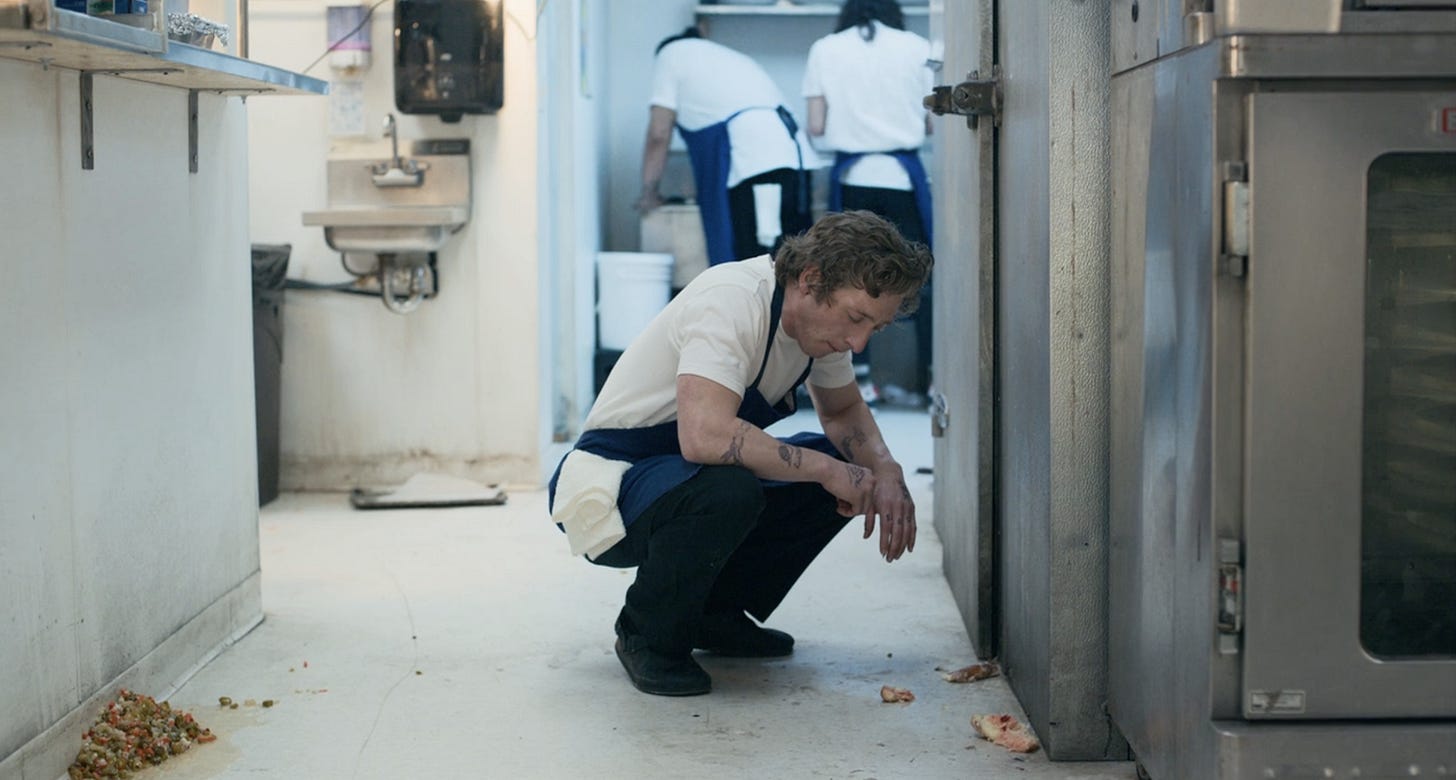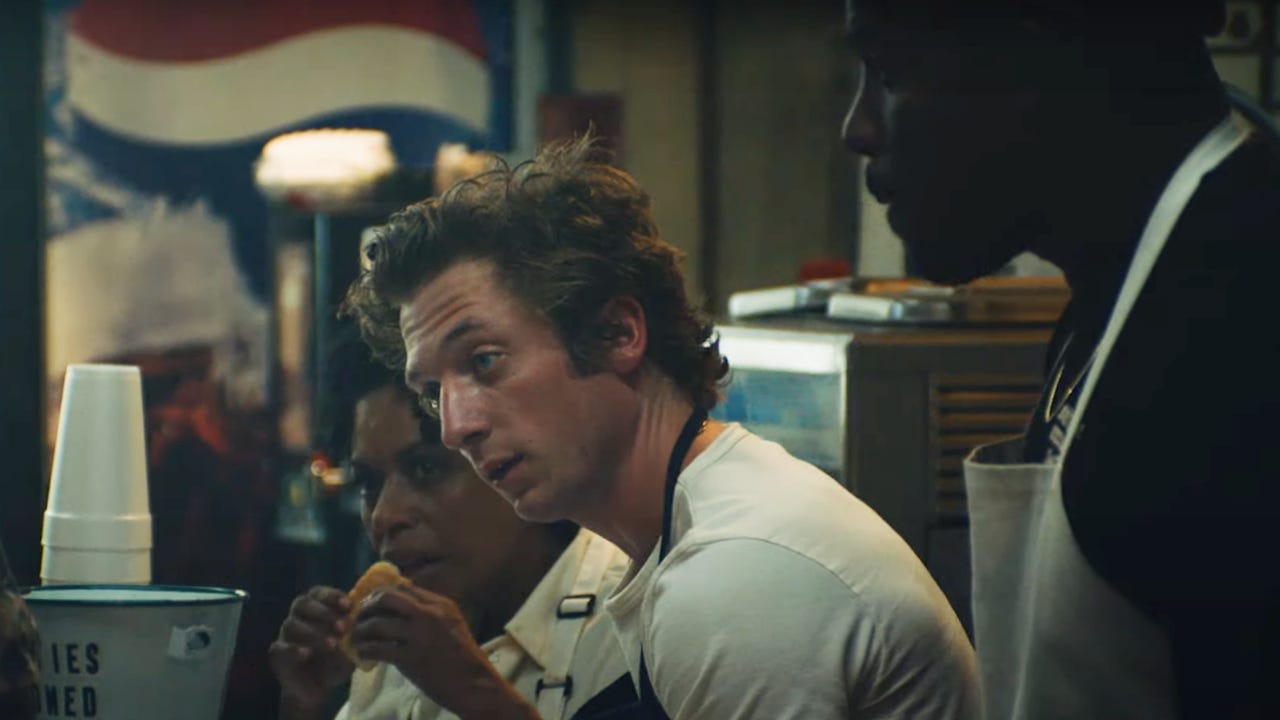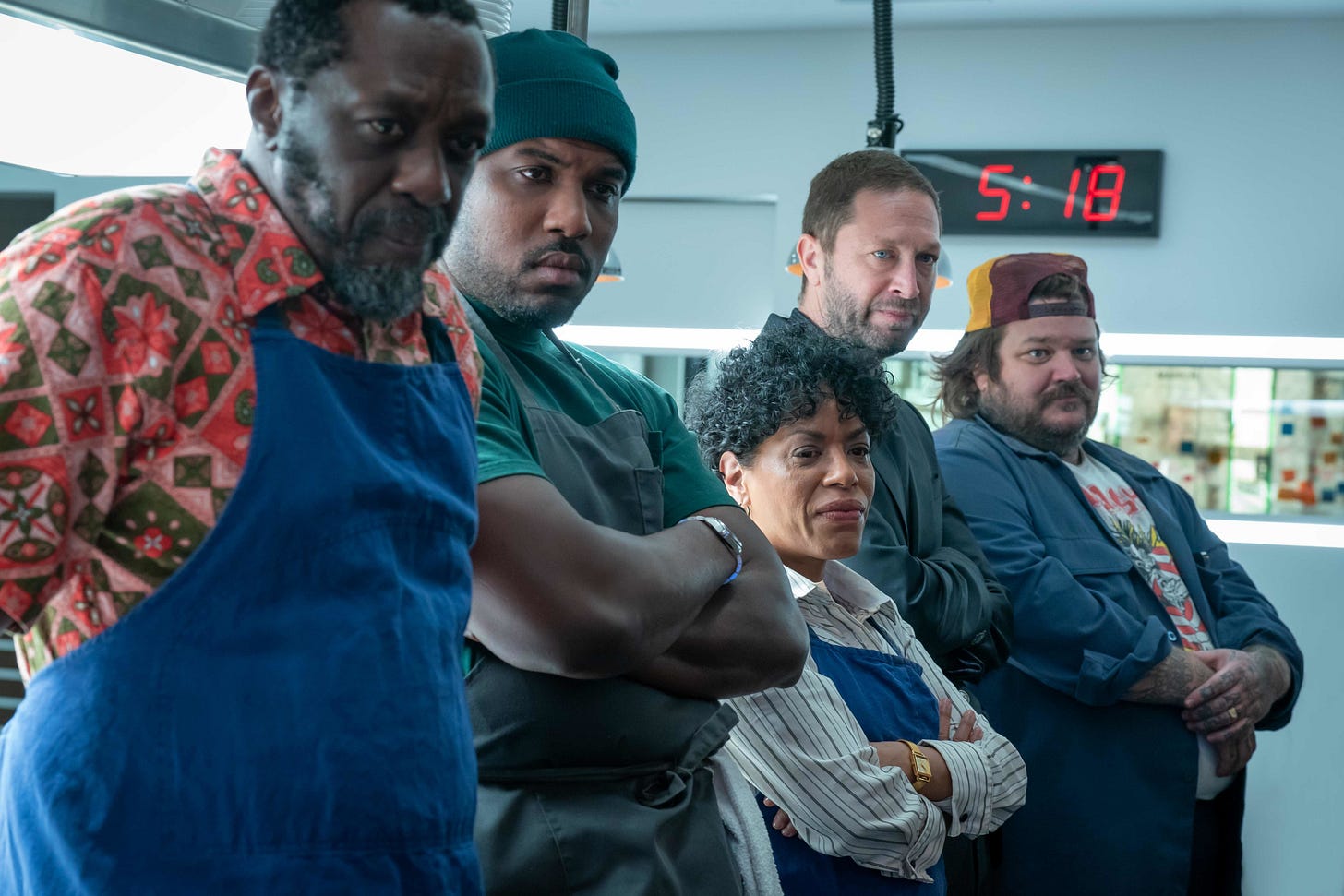The Bear Is A Show About Labor, Just As Much As It’s About Food
Amidst the kitchen chaos, some insights into building multi-generational workplace
“Who's cooking your food anyway?” — Anthony Bourdain, Kitchen Confidential: Adventures in the Culinary Underbelly
Author’s Note: This essay contains spoilers for The Bear season 1 and 2.
I had put off watching The Bear for a while. Caught up in the turbulence of freelance deadlines, academic deadlines, job hunting, interviewing, and picking up side gigs, I wasn’t in the right headspace to subject myself to the show’s cacophony of culinary hypertension (a painfully thrilling cocktail of panic attacks, shouting matches, and that pit-in-your-stomach feeling that something’s going to boil over at any second).
The initial buzz about the show centered around its realistic portrayal of restaurants ranging from elite fine dining to local dives. Ahead of the WGA strike, the show made headlines again—this time because one of its writers, Alex O’Keefe, spoke openly about how he attended an awards show with a bank balance in the negatives and even wrote an episode from his local library in the winter after he lost heat and power in his Brooklyn apartment and the studio refused to fly him to LA to join the rest of the writers room. My interest was piqued, especially as I found myself trying to manage my own professional precarity.
This isn’t going to be a review of The Bear so much as a reflection on what it’s been like to watch the workplace drama during a time that’s been dubbed “Hot Strike Summer.” While the show’s release predated most of the labor actions we see now, food service has long been a hotbed for so many entangled, intersecting labor struggles. Kitchens are places where workers from all kinds of different backgrounds, ages, and skill levels toil together in close, stressful quarters. It’s a profession that (like so many other industries) has been plagued with systemic issues of abuse, low wages, harassment, instability, and discrimination. But it’s also a labor of love and financial necessity for many. Given the show’s commitment to accuracy, I was curious how the show would portray these tensions between authority, passion, hierarchy, and exploitation. Among mouthwatering food shots and ear-splitting screaming matches, a surprisingly nuanced look at one restaurant’s multi-generational workplace emerged.
By the time we meet Carmy—back home in Chicago, trying to figure out how to keep his brother’s restaurant open while also reeling in the wake of his suicide—he’s already racked up a resume most chefs could only ever dream of. He’s collected an absurd amount of accolades, including a couple Michelin stars, a James Beard, and inclusions on a number of ‘Top Restaurant’ and ‘Best Chef’ lists, all while working his way through some of the world’s most elite kitchens. However, his meteoric rise as a hot young genius chef has taken its toll, leaving him burnt out and prone to nightmares and panic attacks.
The Bear ultimately decides to show us very little of Carmy’s past culinary life (a choice that I still feel conflicted about). Instead, it’s alluded to in broad strokes: respect and admiration expressed by the other characters, his frequent use of antacids and severe anxiety, his network of former coworkers who help train his staff. One of the few actual flashbacks we get is of Carmy’s abusive head chef (an unnamed character played with a chilling ruthlessness by Joel McHale). As other chefs who’ve watched the show note, McHale’s appearance and behavior was modeled after Charlie Trotter, one of Chicago’s most notorious chefs. Trotter had a reputation for being difficult to work for, and anecdotes and allegations of verbal and physical abuse, brutal schedules, and wage theft followed him until his death in 2013.
Present-day Carmy is obviously traumatized, and it’s only upon returning to Chicago that he begins to reckon with the impact this experience had on his well-being and his ability to create. His decision to take over Original Beef, initially framed as a way of carrying on Mikey’s legacy, also becomes a way for him to rekindle his love of cooking. It’s a relatable struggle to heal for anyone who’s ever worked a job that drove you to your limits and killed your passion and sanity in the process.
While Carmy’s turmoil is what brings us to Original Beef’s kitchen, I found myself far more interested in what the show had to say about work through the other staff members, particularly Tina, Ebra, and Richie. It’s through these characters that we get a more comprehensive understanding of the different intergenerational pressures, conflicts, and struggles that are common in food service, and a far more astute workplace critique through their respective arcs.
Carmy’s decision to take command of Original Beef is met with an unsurprising amount of opposition and skepticism. One such change is the hiring of sous-chef Sydney. Syd gets put in charge of the kitchen (over the other staff members who have been there far longer), but almost immediately finds her authority disrespected because of her younger age, pretentious taste, and limited experience. This is made most obvious by Tina, the only other female chef in the kitchen, who tries to sabotage Sydney’s first attempts at restructuring the kitchen's workflow.
The inclusion of Tina’s character—her fierce independence, her serious work ethic, her refusal to ask for help, and her hesitation to change—is important, especially when so few stories of older working class women navigating life are told on-screen (sorry the Sex and the City reboot doesn’t count).Tina has fought hard for the position she has in the kitchen, learning how to cook practically on the job and without the same kind of knowledge of fine dining as Carmy and Sydney have. We understand why she’s behaving this way, that her attitude and actions reflect her anxiety of getting pushed out in favor of a younger chef, being made to feel lesser than despite her seniority, that she’s surviving in an industry fraught with ageism and disloyalty.
But Tina doesn’t get pushed out. Instead, she gets invested in, gradually picking up new skills and learning how to work as a member of the team within the kitchen’s organizational hierarchy. Her greatest professional advancement is getting enrolled in culinary school while the restaurant remodels. On her first day, she’s the oldest student there but that doesn’t stop her from pushing herself out of her comfort zone in order to grow into the chef she wants to be (and earns the respect of her peers along the way). By the time we see her at the end of the second season, she’s been promoted to Sydney’s second-in-command, she’s able to adapt to the unpredictable rapid pace of the kitchen rather than reacting against it, and is entrusted with welcoming and training The Bear’s young new hires. It’s a kind of cultivation of talent that can’t grow or survive in a toxic work environment.
While Tina comes to embrace change and finds a better professional path forward, the same can’t be said of Ebraheim, one of Original Beef’s other senior chefs (both in age and longevity). Ebra’s role in the past 2 seasons has left me with mixed feelings. On one hand, his experience as a refugee trying to make his way in America, the way he becomes a fixture of Original Beef, and how he struggles to cope with the restaurant’s radical transformation hit with a bittersweet poignancy. On the other, we end up learning very little about him and what his life in Chicago is like (all while we get scenes with the other characters’ family members).
Perhaps we’re supposed to understand that Ebra’s only family is the staff of Original Beef, as frustrating as that was to watch. Like Tina, Ebra has his own habits, he’s set in his ways, and he also meets Carmy’s desire to remake the restaurant with skepticism. Yet, while Tina at first lashes out and tries to undermine Carmy and Sydney’s roles, Ebra tries to give the new system a chance in order to keep Original Beef in operation. It’s only when Ebra is selected to go to culinary school with Tina that we see him struggle with following the rules of the program (such as wearing a uniform) and taking longer to master each new skill and technique while the other students speed ahead thanks to their prior formal training.
In the end, despite Tina’s urging to complete the program as a team, Ebra stops showing up to classes and ignores Tina’s calls. When we finally see him again, he’s sitting by the lake, smoking a cigar. His expression isn’t a particularly relieved or peaceful one. Since Ebra didn’t want to admit to the rest of the staff that he was struggling and failing in this journey, the decision to give up on culinary school also came with ghosting everyone at the restaurant, further compounding his alienation.
Eventually, he returns to the restaurant and Tina urges him to come back. “Maybe…old bitches like their bitch ways. Maybe they’re happy with where they are. Maybe they don’t want to change too much,” Ebra notes nervously. “But maybe that’s why they surround themselves with bad motherfuckers who take care of them,” Tina responds. This admission of fear isn’t an easy one to make, but Ebra’s vulnerability is met with sympathy and support. When he’s re-welcomed to The Bear, the role he’s given—operating a takeout window that will continue serving Original Beef’s traditional sandwiches—poses new challenges and gives him a greater position of authority, but also adapts to his needs and working style without any guilt or shame.
Arguably one of the show’s most radical professional transformations takes place with Richie, who had been Mikey’s closest friend and his right-hand man before his death. When we first encounter Richie, he’s a Grade-A asshole. Having known Carmy since childhood, he talks down to him. He demeans and butts heads with Sydney when Carmy puts her in charge. Despite his aggressive attitude, he does care deeply about keeping Original Beef open and tries to be a fixer wherever he can, although his combative “I know best” attitude ends up getting the restaurant in trouble several times over the first and second season.
What becomes very clear very quickly is that Richie’s bombastic behavior in the workplace is an attempt to make up for and avoid the mistakes he’s made in the past. As the extent of Mikey’s addiction (and his resulting restaurant management) comes to light, we see how Richie ended up becoming an unintended enabler, and this wracks him with grief and guilt. His wife has also left him, and he’s trying to create a life where he can be the best father for their daughter. Having failed in other job ventures, Original Beef is all he has left, but trying to preserve the kitchen’s old, dysfunctional ways also keeps him from maturing and unlocking his potential. As Carmy begins to implement changes to transform Original Beef into The Bear, Richie struggles to maintain the same sense of purpose his time with Mikey gave him.
Richie’s redemption is a moving one, especially as we watch him step out of his air of self-centeredness and ego into becoming more thoughtful and caring of others. When he’s sent to stage at an upscale restaurant run by one of Carmy’s connections, he finds himself thriving in the intricacies of front-of-house operations as he uses his skills as a people person in a way he hadn’t before. Yet before he’s even able to try his hand at coordinating food and customers, he’s given tedious jobs to strengthen his attention to detail. When asked by his supervisor how he felt about these tasks, Richie answers: “Man, I think I’m 45 years old, polishing forks.” He’s aware that he’s probably the oldest person to have ever staged at the restaurant, but he overcomes that professional insecurity by approaching the experience with a humbleness and eagerness to learn.
The Bear’s final episode takes place on the opening night of the newly renovated restaurant, a way of putting all the growth and knowledge these characters have gained over the season to the test. When Carmy accidentally gets stuck in the walk-in freezer (because, distracted by his new relationship, he forgets to call someone to fix it), Sydney, Tina, Richie, and the others step up to cover for him. Watching them speed up the kitchen’s pace and catch up on delayed orders is thrilling, if not slightly nerve-wracking. Yet they manage to pull it off, ending the night in the once-dysfunctional kitchen with satiated guests and a precise new working rhythm.
The Bear is concerned with toxic cycles, patterns of behavior, and how we can either choose to break them and create better work environments or doom ourselves to repeat them. It’s a show that also invites us to contemplate the personal cost of success, the risks of losing yourself as you turn your passion into your job, how to keep that love and care alive, and how so many of use have grown to normalize mistreatment, exploitation, and extreme stress in our our workplace. Carmy, despite being the most skilled chef, is the one who fails to learn those lessons of self-growth and teamwork as the others have. In a parallel to his meltdown in the first season, Carmy falls back into his individualistic ways, and lets out his stress by berating the staff when they can’t keep up with the pace (despite his notable absence from the kitchen). Did I get a sick kind of amusement watching Carmy spiral in that walk-in, thinking everything was going terribly wrong on the other side of that door when, in fact, everyone was able to come together and clean up his mistakes with the high standard he expected of them? Absolutely.
The food service industry, whether it’s upscale restaurants or fast food places, is very rarely depicted accurately within pop culture. When we think of who works in these restaurants, it’s continuously assumed that all the workers are going to be young (one of the more idiotic arguments against raising minimum wage has been that those jobs are done by high school and college students, which is simply not true). The Bear reminds us that the workplace behind kitchen doors is far more diverse than the image of restaurants in our cultural imaginary. Fights to improve labor conditions (including better mental healthcare) should be inclusive of workers’ different experiences based on their age, race, gender, class and cultural background.
The Bear’s third season is one of the many TV projects currently on hold because of the WGA and SAG strikes. With no end in sight, it’s unclear when we’ll see these characters again or how their stories will be shaped by this past year of labor actions. While the second season of The Bear did focus more of its attention away from Carmy and onto the other chefs, I still found myself wanting more. I hope the writers take the opportunity to show us more of Tina and Ebra’s lives, their ambitions, and their relationship to food beyond the restaurant kitchen. Other characters, like Original Beef’s dishwashers, were mostly kept in the background for comedic relief and the restaurant has a newly-expanded staff of servers and chefs which, since they only first appeared in the penultimate episode of this season, were barely introduced to us, acting mostly as bodies filling the space and preparing the meals. This leaves ample opportunity to expand the show’s principle cast, while also exploring other back- and front-of-house roles in restaurants that are far less flashy and visible as chefs. Just as recipes are continuously revisited, reinvented, and remade, The Bear has a chance to take the ingredients of the traditional workplace drama and rework them into an incisive, mouth-watering reflection on the state of work today.










